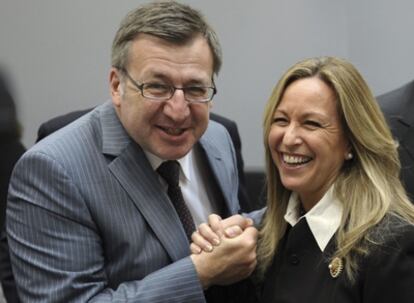EU softens Cuba stance in response to Spanish efforts
Foreign Minister Jiménez calls for "new relationship" with island
The European Union decided yesterday that it would begin efforts to improve ties with Cuba, while keeping in place its "common position," which demands that the Castro regime make progress on democracy and human rights before a bilateral relationship is normalized. Spanish diplomacy of recent times has opened the way to a milder stance on the communist-run island.
At a meeting in Luxembourg yesterday, EU foreign ministers handed the task of analyzing a future approach to Cuba to Catherine Ashton, the EU's foreign affairs chief. Ashton will now establish contact with the Castro authorities and will return to the ministers with her ideas in December.
The EU's decision vindicates the stance of Miguel Ángel Moratinos, who was Spain's foreign minister until last week's surprise Cabinet reshuffle. Moratinos had long argued that recent events in Cuba should be taken into account, in particular the freeing of political prisoners. This stance was adopted passionately yesterday by his successor, Trinidad Jiménez, both in conversation with Ashton and with all her fellow foreign ministers, according to EU sources.
Although she does not plan to visit the island, Ashton concluded that now is the time to establish contact with Cuba due to the apparent opportunity offered by the change in approach to prisoners. Prior to the meeting, Jiménez had called on the EU to give Cuba "a sign" in order to begin building bilateral relations, and help to consolidate the process of reforms on the island. A "new relationship" between the EU and Cuba "is necessary," Jiménez said Monday.
Jiménez, who was attending her first EU meeting as foreign minister, pointed out that Cuba has freed 42 political prisoners during recent months, and has approved economic reforms that open certain sectors to private activity. As such, she argued, "if Cuba has given a sign" by carrying out changes requested by the European bloc, then the EU should respond.
Jiménez added that Spain is seeking the "biggest consensus possible between our partners in the European Union," with the objective of working "so that a new relationship between the EU and Cuba is recognized."

Tu suscripción se está usando en otro dispositivo
¿Quieres añadir otro usuario a tu suscripción?
Si continúas leyendo en este dispositivo, no se podrá leer en el otro.
FlechaTu suscripción se está usando en otro dispositivo y solo puedes acceder a EL PAÍS desde un dispositivo a la vez.
Si quieres compartir tu cuenta, cambia tu suscripción a la modalidad Premium, así podrás añadir otro usuario. Cada uno accederá con su propia cuenta de email, lo que os permitirá personalizar vuestra experiencia en EL PAÍS.
¿Tienes una suscripción de empresa? Accede aquí para contratar más cuentas.
En el caso de no saber quién está usando tu cuenta, te recomendamos cambiar tu contraseña aquí.
Si decides continuar compartiendo tu cuenta, este mensaje se mostrará en tu dispositivo y en el de la otra persona que está usando tu cuenta de forma indefinida, afectando a tu experiencia de lectura. Puedes consultar aquí los términos y condiciones de la suscripción digital.




























































